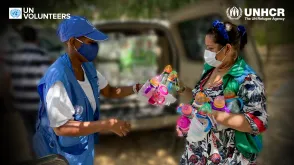Born in Zimbabwe, Tashana Ntuli is a UN Volunteer Associate Protection Officer for UNHCR Colombia in La Guajira. She supports Venezuelan refugees and migrants, and is powered by her own experience of such vulnerability. Tashana had to leave her country at several points in time and receive internally-displaced people from other cities, so her empathy is both personal and informed.
The large-scale mixed movement of Venezuelan refugees and migrants has become one of the top five humanitarian crises in the world. For the International Day of Peace, let us recognize the efforts of those who try to make Latin America a peaceful, united and resilient region. One of these is Tashana.
Venezuelan refugees and migrants have to cross informal passages where their rights may be in jeopardy and women and children are exposed to the risk of sexual abuse. Although there may be no language barrier, they often arrive in places where they don’t know anyone and are vulnerable. The situation gets worse if they are members of traditionally discriminated groups, such as the LGTBIQ+ community. --Tashana Ntuli, UN Volunteer Protection Officer with UNHCR, Colombia
According to 2020 figures, 5.4 million Venezuelans have abandoned the country, and there was an 8,000 per cent increase in refugee status applications. Furthermore, 4.3 million people have needs in water, sanitation and hygiene, 3.7 million in food security and 2.8 million in health. Of these, 54 per cent are women, children and adolescents (source: OCHA).
The majority of Venezuelans arrive in countries where the local structures are not prepared to respond to a large influx of people. The negative impact on the host population translates into a competition for scarce resources, social discomfort and xenophobia. Mitigating those effects, distributing the burden of the mixed movement and supporting local communities is essential to fostering peace and development.
Colombia is the main host country, with 1.7 million refugees and migrants. Of the 2,417 Venezuelans who participated in the first round of the high frequency survey in 2021, 79 per cent identified needs related to the survival of their families, including food security, housing and clothing.
While the COVID-19 deepens the difficulties of refugees and migrants in Venezuela, the need for aid is even more urgent, according to UNHCR. Hundreds of thousands of Venezuelans do not possess the required documentation to stay legally in the host countries. This constrains their access to basic services, the formal labour market and social security programmes. With temporary protection status, the Venezuelan population in Colombia will be able to access their rights and services, while their resident visa is being processed.
What do we need to do to enable these five million displaced people to have a vida digna (dignified life)? For Tashana Ntuli, empowering the displaced, supporting host countries and collaborating with local indigenous communities are key.
"It is important to strengthen dialogue spaces between the host population, refugees and migrants in order to enhance common points and move towards service access," Tashana says. She believes the Venezuelan-Colombian binational indigenous communities have a lot to contribute. "We need to learn from their understanding of the world," Tashana asserts. "How they live, look out for each other, collectivize their resources and connect."
As UN Volunteers we are dedicated to the people. We want to close the gap and make a positive impact in communities. Adopting approaches built on interculturality and solidarity may be a solution for the Venezuelan people. --Tashana Ntuli
Tashana is one of 287 UN Volunteers serving with UNHCR in Latin America and the Caribbean. Collectively and individually, their experience, professionalism and empathy adds value to UN entities.

